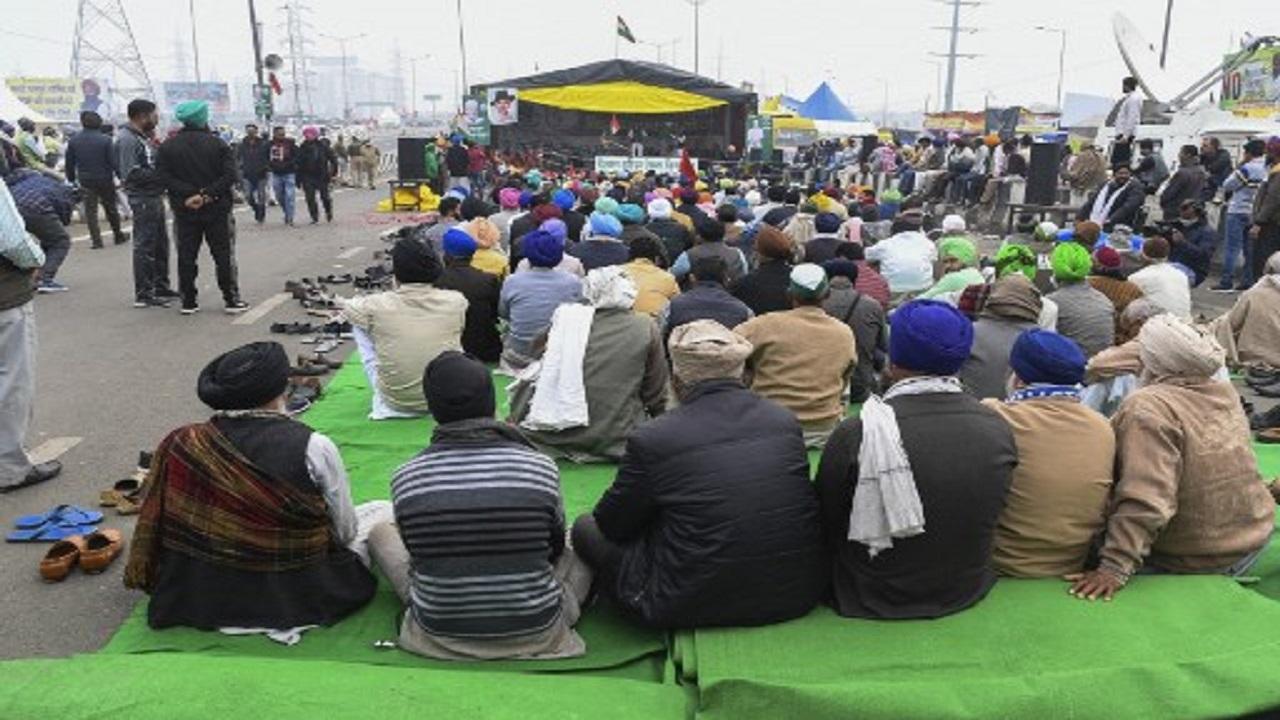The Supreme Court was hearing a batch of petitions, including those filed by DMK MP Tiruchi Siva, RJD MP Manoj K Jha, challenging the constitutional validity of the three farm laws passed by the Centre, along with the plea to remove protesting farmers from Delhi borders.

Protesting farmers listen to their leaders along a blocked highway during a protest against the central government's recent agricultural reforms, at the Ghazipur Delhi-Uttar Pradesh state border, in Ghaziabad. Pic/AFP
The Supreme Court on Monday told the Union government to put farm laws implementation on hold or they will do it. “If the Centre does not want to stay the implementation of farm laws, we will put a stay on it. The Union of India must take responsibility for all this. You (Centre) are bringing the laws and you can do it in a better manner,” Chief Justice of India SA Bobde said.
ADVERTISEMENT
The apex court was hearing a batch of petitions, including those filed by DMK MP Tiruchi Siva, RJD MP Manoj K Jha, challenging the constitutional validity of the three farm laws passed by the Centre, along with the plea to remove protesting farmers from Delhi borders.
“We don't know what negotiations are going on? Can the farm laws be put on hold for some time? asked the CJI.
Stating disappointment with the way the process is going, the CJI said, “Some people have committed suicide, old people and women are a part of the agitation. What is happening?”
“Each one of us will be responsible if something goes wrong. We don't want anybody's blood on our hands,” Bobde said, adding that not a single plea has been filed saying that the farm laws are good.
Senior advocate Dushyant Dave, appearing for one of the farmers' unions, said, “How can such important laws be passed through a voice vote in Parliament. If the Centre is serious, then it can hold a joint session of Parliament. Why is the government shying away from it.”
Arguing for the government, Attorney General KK Venugopal said, "You can form a committee but don't stay the laws. The Court cannot stay legislation unless it finds that the law is passed without legislative competence and the law violates fundamental rights. There are Supreme Court precedents saying that the Courts cannot stay legislation."
“What happened with Haryana CM cannot happen. On 26th January, farmers with their tractors are planning to march down to Rajpath to destroy a day of national importance, Venugopal further said.
The Supreme Court said it wants to make it clear that it is not stifling protest and the protest could carry on.
But the question is whether protest should be held at the same site or should be shifted to accommodate free movement of citizens, the top court said.
The apex told the Centre that it is reiterating to form a committee to examine the farm laws. "Until then, the court can stay the implementation of the farm laws. We want the atmosphere to be conducive, let the laws be on hold and go to the committee," said the CJI.
The court said it apprehends there may be violence at the protest site intended or unintended.
Meanwhile, senior lawyer, Harish Salve, representing one of the petitioners, stated that there are few elements which should be weeded out from the protest. Salve mentioned about a Vancouver based organisation collecting money under the banner 'Justice for Sikhs'.
The eighth round of talks between the Centre and the farmer unions on January 7 appeared heading nowhere as the Centre ruled out repealing the contentious laws. The Centre and the farmer leaders are scheduled to hold their next meeting on January 15.
The top court, which had observed that there is no improvement on the ground regarding farmers' protests, was told by the Centre on the last date of hearing that "healthy discussions" were going on between the government and the unions over all outstanding issues.
The court had then assured the government of an adjournment on January 11 provided it urges so, saying that the settlement through talks was a possibility.
After the eighth round of talks, Agriculture Minister Narendra Singh Tomar had said no decision could be reached as the farmer leaders did not present alternatives to their demand for the repeal of the laws.
On Saturday, a farmers' body, Consortium of Indian Farmers Associations (CIFA), moved the top court in support of the three laws. It said the laws are "beneficial" to farmers and will enable increased income and growth of agriculture.
Enacted in September, the three laws have been projected by the central government as major reforms in the agriculture sector that will remove the middlemen and allow farmers to sell anywhere in the country.
However, the protesting farmers have expressed apprehension that the new laws would pave the way for eliminating the safety cushion of Minimum Support Price and do away with the mandi system, leaving them at the mercy of big corporates.
 Subscribe today by clicking the link and stay updated with the latest news!" Click here!
Subscribe today by clicking the link and stay updated with the latest news!" Click here!






